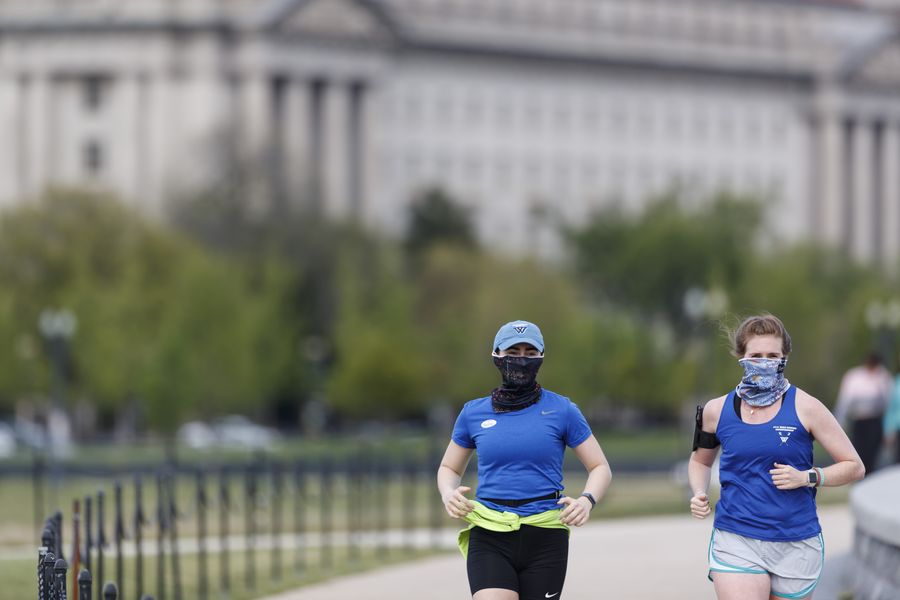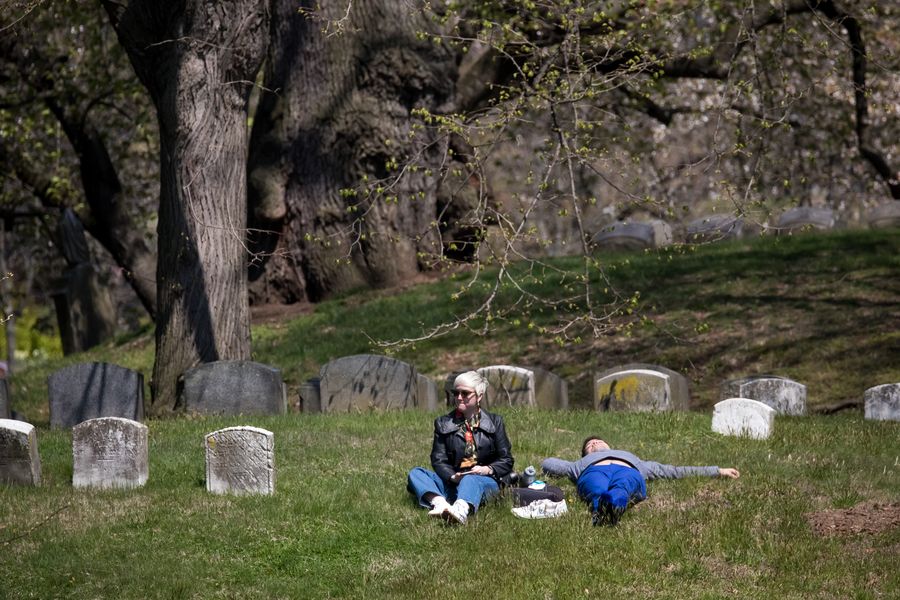Pandemic Watch: Debates over stay-at-home orders rise in U.S., as confirmed cases top 780,000. (Xinhua/Tan Yixiao, Hu Yousong)
"Reopening our economy today would backfire on us two-fold."
WASHINGTON, April 20 (Xinhua) -- Some U.S. states are moving to ease stay-at-home restrictions intended to limit the spread of COVID-19, though health experts have urged caution in removing the measures.
Georgia State Governor Brian Kemp announced on Monday that some businesses in the state, including gyms and hair salons, can reopen as early as Friday, but acknowledged that the number of infections will likely go up as more people are out.
"Now, I will say that, you know, we have more people moving around, we're probably going to have to see our cases continue to go up, but we're a lot better prepared for that now than we were over a month ago," the Republican governor said. "We have the hospital bed capacity. We have the community knowledge. We have a lot of things in place now."
All businesses that reopen, he added, must follow social distancing guidelines and screen employees for illness.

People run on the National Mall in Washington D.C., the United States, April 19, 2020. (Photo by Ting Shen/Xinhua)
Also on Monday, governors of South Carolina, Tennessee, Illinois, and Louisiana announced moves intended to restart economy and public life in their states.
New Jersey Governor Phil Murphy, who has not joined them, said Monday that reopening the state must be "careful" and "strategic."
"This is a two-part scenario - securing the public health situation so you can have confidence as you get back as we reopen our economy. Right now, that confidence does not exist," the Democrat tweeted. "Reopening our economy today would backfire on us two-fold - a large spike in #COVID19 cases, and no customers at our stores because people are still fearful for their health and that of their kids and families."
The decisions came amid debates on whether it's time for states to lift stay-at-home orders as anti-quarantine protests were popping up around the nation, in which attendees argued that restrictions were unnecessary or have gone on too long.

People walk on the Coney Island boardwalk in the Brooklyn borough of New York, the United States, April 19, 2020. (Photo by Michael Nagle/Xinhua)
CAUTION URGED
Anthony Fauci, the nation's top expert on infectious disease, urged caution on Monday for states to reopen and warned that moving too quickly may backfire.
"Clearly this is something that is hurting from the standpoint of economics and the standpoint of things that have nothing to do with the virus, but unless we get the virus under control, the real recovery economically is not going to happen," Fauci, directer of the National Institute of Allergy and Infectious Diseases, said on ABC's "Good Morning America."
"So what you do if you jump the gun and go into a situation where you have a big spike, you're going to set yourself back," the key member of the White House coronavirus task forces continued. "So as painful as it is to go by the careful guidelines of gradually phasing into a reopening, it's going to backfire. That's the problem."

A man wearing a face mask rides a bicycle on the National Mall in Washington D.C., the United States, April 19, 2020. (Photo by Ting Shen/Xinhua)
According to a tally from Johns Hopkins University on Monday, the number of coronavirus cases in the United States has exceeded 784,000, with more than 42,000 deaths. New York State, having reported more than 253,000 cases and over 18,000 deaths, remains the nation's largest epicenter of the outbreak.
A new report, released by Harvard University's Edmond J. Safra Center for Ethics on Monday, said that the United States will need to administer 20 million tests for the coronavirus each day by mid-summer in order to fully remobilize the economy in a safe fashion.
The value in increasing testing dramatically is that it will "prevent cycles of opening up and shutting down," the authors argued, adding that the testing output will allow the virus to be adequately managed until a vaccine is developed.
"This Roadmap is the only approach to BOTH contain the virus and ramp back up to vibrant economic life. And, in the long term, it allows us to build an infrastructure of pandemic resilience that will serve us well when the next health crisis or disaster hits, while improving community health," Danielle Allen, director of Harvard University's Edmond J. Safra Center for Ethics, said in a statement.
U.S. President Donald Trump said on Monday that states, not the federal government, should be doing the testing, as some governors have complained that the federal government hasn't followed through on its responsibility to help states get access to supplies.

People are seen on the grass beside graves in Green-Wood Cemetery in the Brooklyn borough of New York, the United States, April 19, 2020. (Photo by Michael Nagle/Xinhua)
New York Governor Andrew Cuomo pushed back the president's claim on Monday.
"What those states will run into is ... those labs can only run as many tests as the national manufacturers provide them chemicals, reagents and lab kits," the Democrat contended. "The national manufacturers say they have supply chain issues. I'd like the federal government to help on those supply chain issues."
"The federal government, you're painting a room with a roller," he continued. "Somebody has to come behind you with a brush and do the details. ... Let the federal government do what they can, if it requires a brush, let the state government do it." ■



